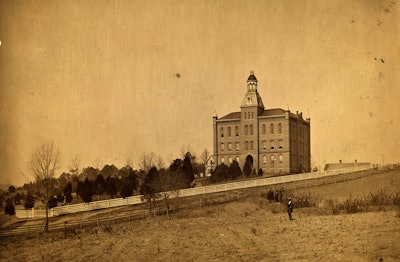It’s taken months of collaboration across institutions, but east Tennessee’s only Historically Black College and University (HBCU) is on track to regain accreditation. The college is anticipating submitting its application for approval in April.
Knoxville College (KC), a private institution, lost its accreditation in 1997. Since then, it has regained authorized status in Tennessee, which allows them to confer credentials. If the school is able to regain accreditation, as those involved believe will happen soon, students will be able to access federal financial aid funding and state funding opportunities, including the Tennessee Student Assistance Award, which offers repayment-free financial aid to students from low-income backgrounds.
“KC lost accreditation for a number of reasons, one of those being financial stability. Financial aid for students is one of the largest conduits of state dollars to the institution,” said Dr. Brittany Mosby, director of HBCU Success, a branch of the Tennessee Higher Education Commission focused on the health and sustainability of the state’s seven private and public HBCUs. “In the 2021 school year, about $10 million went to HBCUs in the state through financial aid, and the year before that it was $12 million. That’s one of the reasons why accreditation is so important.”
 Dr. Dasha Lundy, executive vice president and chief operations officer of Knoxville College and District 1 Commissioner for the Knox County Commission.
Dr. Dasha Lundy, executive vice president and chief operations officer of Knoxville College and District 1 Commissioner for the Knox County Commission.
Lundy said Dr. Kevin James, president of MBC, was an inspiration.
“He did it, so we can do it too,” said Lundy. She reached out and asked James if he would help KC in its mission to regain accreditation. “[James] believes in HBCUs, so he said yes. He’d been through it and he knew the pitfalls. He knew how to guide the team. If we did this by ourselves, it would have took longer.”
Lundy said it was James who reached out across town to connect with the University of Tennessee (UT) Knoxville. Dr. J. Patrick Biddix, professor and program coordinator of the Higher Education Administration Ph.D. program at UT Knoxville, said he was excited for the chance to collaborate with KC, not only so his students could get hands on experience in the process of accreditation, but to help an institution as important as KC.
“KC has been a part of the Knoxville community for 150 years,” said Biddix, recalling the awe-inspiring moment he and his team of ten graduate students experienced walking through McKee Hall on KC’s campus, where Rev. Dr. Martin Luther King, Jr. gave the commencement address in 1960.
“You can teach students what it’s like to work at state or private institutions, but an HBCU is special. It’s different, it’s needed, it’s necessary,” said Biddix. “HBCUs come with a tremendous amount of history. A lot of the learning took place for the students beyond accreditation, in understanding the importance and necessity of HBCUs in this country.”
KC was founded in 1875 by the United Presbyterian Church for the education of newly freed men and women. By the middle of the 20th century, KC had become a liberal arts institution with a reputation for organizing social justice movements like sit-ins. Lundy, who is also the District 1 Commissioner for the Knox County Commission, wants to see the institution become a north-star for their community once again.
 Early photo of McKee Hall at Knoxville College.
Early photo of McKee Hall at Knoxville College.
“The process of creating and understanding the materials, the pieces for the accreditation process, and the opportunity to work with a board of trustees toward approval and revision—that’s an incredibly valuable experience for the students,” said Biddix.
Biddix, Lundy, James and the A-Team are now in the final process of reviewing the hundreds of documents that make up their accreditation application, “crossing the t’s and dotting the i’s,” Lundy said.
“It’s been a long journey. I’m grateful for the team that’s stuck with us. It hasn’t been easy,” said Lundy, adding that the partnership KC, UT Knoxville, and MBC have built is testament to the power of what institutions can accomplish when they come together to “educate, empower, and elevate communities.”
“When we think about retention rates, especially with Black males—HBCUs are still significant. We may not have a billion dollar endowment, but we can depend on our sister institutions to help us,” said Lundy. “That’s what it’s all about. We’re here to serve people. This is a collaboration to show institutions can come together, not worry about who is taking whose students—it’s about lifting people and giving education to more people.”
Liann Herder can be reached at [email protected].




















